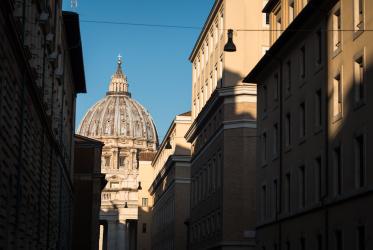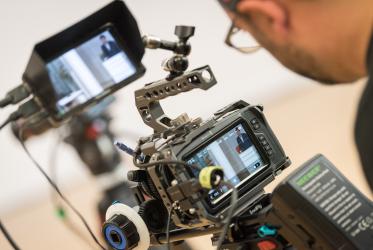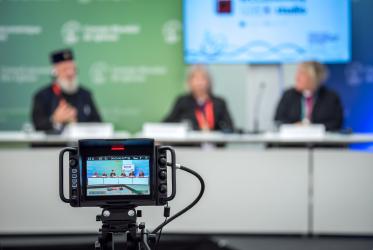Introduction
The Committee had an introduction to the consensus method by Ms Anne Glynn-Mackoul with reference particularly to its work. At the conclusion of the Committee's work, it felt initial frustration with the consensus method which later was transformed into appreciation.
Expression of Appreciation
The Committee expressed appreciation to the staff for their continuing commitment to ecumenism and the work of the WCC and for their hard work especially through the recent period of reorganization and financial difficulties.
1. Report of the Moderator (CC doc GEN 2)
Members of the Committee expressed appreciation for the biblical and theological thought in the Moderator's Report. Comments were forwarded to Policy Reference Committee III.
2. Report of the General Secretary (CC doc GEN 3)
Members of the Committee expressed appreciation for the General Secretary's Report, for its analytic quality, breadth and vision for the future, and passed comments to Policy Reference Committee III.
3. Report of the Officers (CC doc GEN 1)
The Committee expressed appreciation for the Report of the Officers and passed comments to Policy Reference Committee III.
4. Harare to Porto Alegre Report (CC doc GEN 7)
The report was received with appreciation and comments were passed to the Programme Committee.
5. Programme Evaluation Report (CC doc GEN 8)
The Committee expressed appreciation for the Report and passed comments to the Programme Committee and to Policy Reference Committee II.
6. Statement on Ecclesiology (CC doc GEN 13)
The Committee heard an introduction to the Statement on Ecclesiology from Dr Thomas Best. The Committee expressed appreciation for the document and sees it as a helpful and useful statement, and commends it to the Assembly for acceptance. The Committee considers there may be advantage in formulating the document in more prayerful language and/or in simpler language for discussion purposes in local contexts to allow its wider dissemination and reception. Other comments were passed to Dr Best for discussion by the drafting group appointed by Faith and Order.
The Committee expressed concern about the language of paragraph 9 and asked for clarification on the following points: What does it mean that the church is not an end in itself', when it is the Body of Christ? What is the nature of emptying itself' in this context? What is the nature of a mission' referred to in the context of inter-faith? The Committee recommends that the first sentence be deleted.
The Committee recognizes that some questions in paragraph 12 are for bilateral dialogues, whilst others are for conciliar contexts. Their combination in one series of questions may be confusing. The Committee recommends that the paragraph be reformulated.
7. Membership Issues (CC doc GEN 9.1)
The Committee supports Proposed Action 1 (Article II of the Constitution).
The Committee supports Proposed Actions 2 (Article I of the Rules).
The Committee supports Proposed Action 3 (Article II of the Rules).
8. Report of the Steering Committee of the Special Commission (CC doc GEN 10) and Report of the Inter-Orthodox Pre-Assembly Meeting, 10-17 January, 2005, Rhodes, Greece (POL 1.5 and CC doc GEN 10.1)
The Committee received the Report GEN 10.
The Committee received the Report GEN 10.1 with appreciation and commends it for use as a background document for the Assembly.
9. Move to Consensus Method (CC doc GEN 4, 4.1, 4.2, 4.3, 4.4)
The Committee received the documents and sent its comments to Policy Reference Committee III.
10. Relations with the Roman Catholic Church (CC doc GEN 12, POL 1.6)
The Committee heard an introduction to the Eighth Report of the Joint Working Group (JWG) between the Roman Catholic Church (RCC) and the World Council of Churches from the Right Reverend Dr Jonas Jonson, Co-Moderator of the Joint Working Group, and Msgr John Radano, Pontifical Council for Promoting Christian Unity (PCPCU). The Committee welcomed the documents Ecclesiological and Ecumenical Implications of a Common Baptism; Nature and Purpose of Ecumenical Dialogue; and Inspired by the Same Vision: Catholic Church Participation in National and Regional Councils of Churches.
The Committee warmly welcomed the Report and recommends the continuing work of the JWG, recognising the importance of maintaining and building the relationship in our current world context. The Committee particularly commends the directions for work set out in paragraphs 1-4 under Recommendations from the JWG to the RCC and the WCC'.
The Committee commends the thought being given to the reception of the Report, including its presentation at the Assembly in 2006, its presentation to the PCPCU and the preparation of study guides.
The Committee recommends the preparation of study guides be a priority for a new JWG. The Committee urges the member churches of the WCC to take up the Report and its accompanying documents for discussion bearing in mind their relevance for particular constituencies.
The Committee recommends that the JWG place on its agenda the current discussions concerning the reconfiguration of the ecumenical movement.
The Committee recommends the consultation be held in November 2005, as proposed, to celebrate the 40th anniversary of the JWG and revisit its mandate.
11. Relations with the Pentecostals (POL 1.7)
The Committee heard an introduction to the Report of the Joint Consultative Group WCC-Pentecostals from the Rev Dr Bruce Robbins, Dr Despina Prassas and the Rev Jacques Matthey. The Group has met once since the last CC meeting, in Johannesburg, South Africa, in 2004, and will meet in Cairo Egypt, in 2005.
The Committee welcomed and received the interim report containing an annotated outline of the final report for the Assembly from the JCG and commended the work of the Group since its inception at Harare in 1998.
The Committee recommends that the JCG present its official report for the Assembly to the Executive Committee meeting in September 2005.
The Committee heard of the difficulties in establishing dialogue between Pentecostals and the WCC, and affirmed the importance of building the relationship, especially in light of the process of the Global Christian Forum.The Committee endorsed the methodology expressed in the development of a document of common affirmations of faith in narrative style, and the foundation of conversation in Bible Study.
The Committee recommends the continuation of the JCG and endorses its goal to build relationships between the Pentecostals and member churches of the WCC. The Committee commends the directions for the conversation suggested, including the themes of the nature of the church, mission, understanding charismatic gifts, sacraments, and nature of Scripture.
The Committee recommends that the APC find ways to enable Pentecostals to participate in the WCC Assembly in 2006.
12. Ecumenism in the 21st Century (CC doc GEN 11)
The Committee heard an introduction to the Final Statement from the Consultation Ecumenism in the 21st Century from Dr Beth Ferris. The Committee endorses the continuation of the work of this Group. The Committee affirms the centrality of theological dialogue about the nature of unity and the nature of the church, the mapping study of existing programmatic work, the clarification of the respective roles of the main actors in the ecumenical movement and of the WCC's role in ensuring coherence of the ecumenical movement. With reference to section 8 Establishment of a Continuation Committee, the Committee recommends, in the light of the work of the Special Commission, that two of the five WCC representatives be from Orthodox churches. The Committee refers to the Officers the choice of people to represent the WCC and recommends that such people be members of the Central Committee who understand the complexities of the ecumenical movement, be delegates to the 9th Assembly and that attention be given to gender, confessional and regional balance.
13. Global Christian Forum (POL 1.8)
The Committee heard an account of the history, progress and future plans of the Global Christian Forum from Mr Hubert van Beek (consultant). The Committee endorses the Forum's aim to promote Christian unity through opening up conversations between churches which have not previously engaged in conversation with each other. The Committee commends the Forum's methodology whereby representatives of churches tell their faith journey. The Committee commends the continuing work of the Forum, recognising difficulties in resourcing such work but affirming its value in broadening the fellowship of churches in the one ecumenical movement and contributing to ecumenical renewal in the 21st century.
The Committee recommends that the Forum Continuation Committee submit a report to the Assembly outlining what has been learned since its conception at Harare in 1998, the progress that has been made, and its future plans.
The Committee recommends that the CC encourage ecumenical partners to contribute to the costs of the Forum's continuing work.
14. Relations with Regional Ecumenical Organisations (POL 1.9)
The Committee heard an introduction to the Report from Dr Beth Ferris. The General Secretaries of REO's met in Nairobi in 2004. The Committee received the Report and welcomed the positive atmosphere of the meeting between the General Secretary of the WCC and the General Secretaries of REOs.
15. Relations with Christian World Communions (CWCs) (POL 1.10)
The Committee heard from Ms Teny Pirri-Simonian, an outline of progress in relationships between the WCC and CWCs, through the WCC sending representatives to CWCs meetings, through the annual meeting of the Conference of Secretaries of CWCs, and through cooperation between the WCC, WARC and LWF. The Committee recognises the importance of these relationships, especially in the context of the reconfiguration of the ecumenical movement, and sees potential for closer cooperation, coordination and the development of greater complementarity at a programmatic level. The Committee commends the work of the staff team.
The Committee recommends
<typolist>
affirms the value of the fellowship of the Baptist members of the WCC and their contribution to its life
greets the Rev David Coffey, incoming president of the Baptist World Alliance.
</typolist>
16. Ecumenical Officers (POL 1.11)
The Committee received the Report of the Ecumenical Officers' meeting in Geneva in 2004 and commends the plan to meet soon after this CC meeting to enable immediate follow-up of decisions and discussions.
17. Visits and Visitors (POL 1.12)
The Committee received the Report and endorses the continuing work.
All of the POL documents mentioned in this report are available upon demand.



